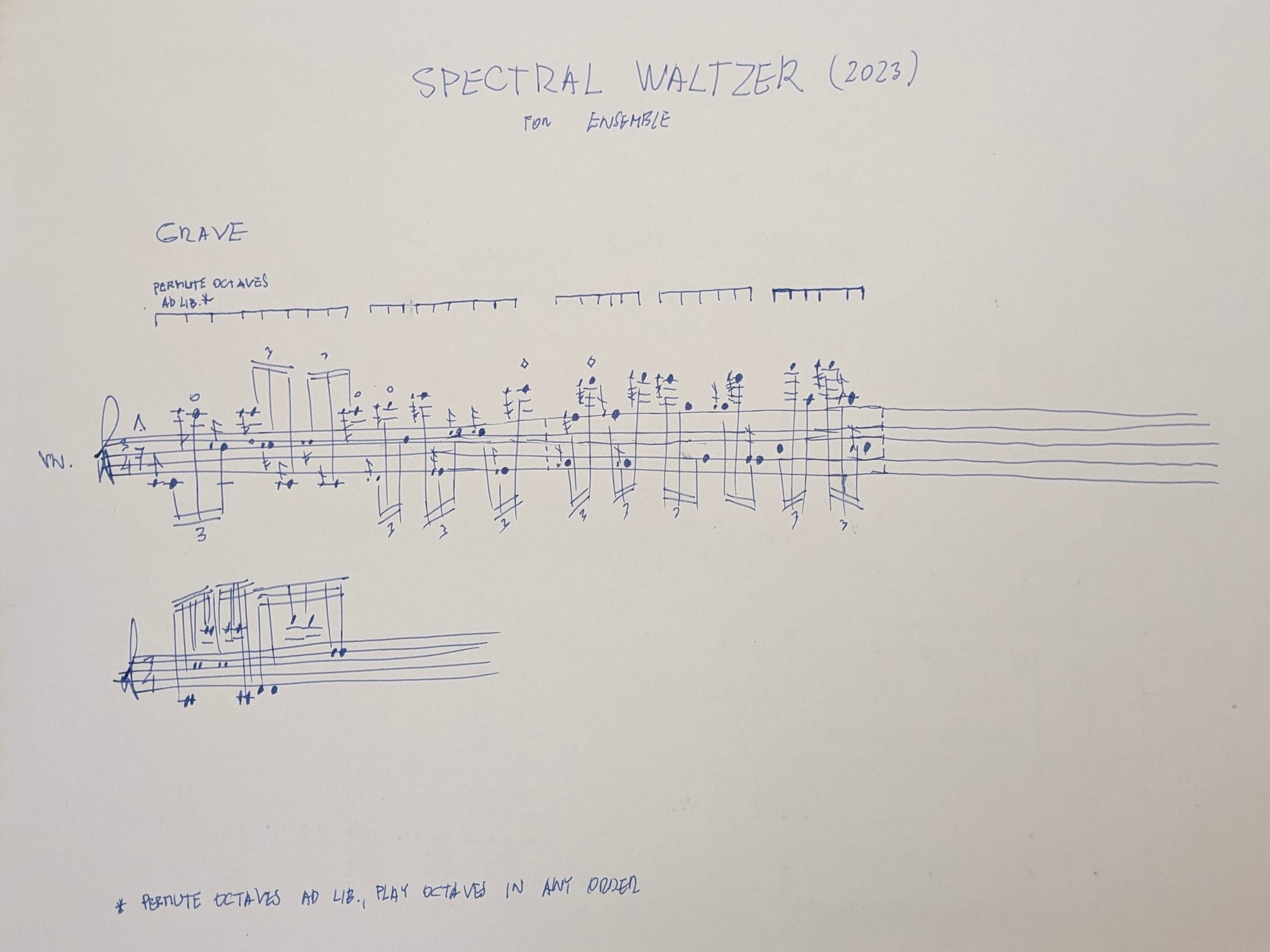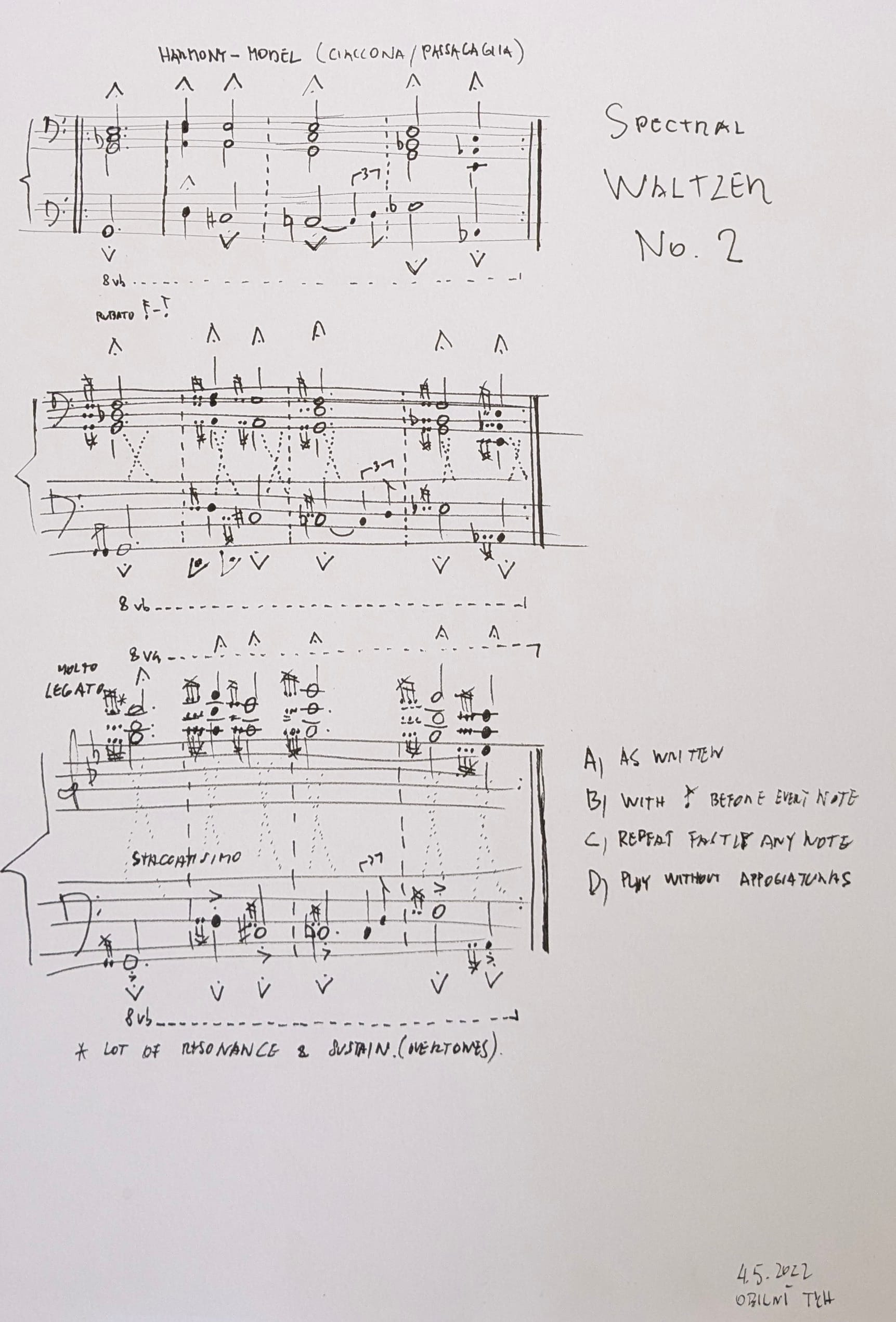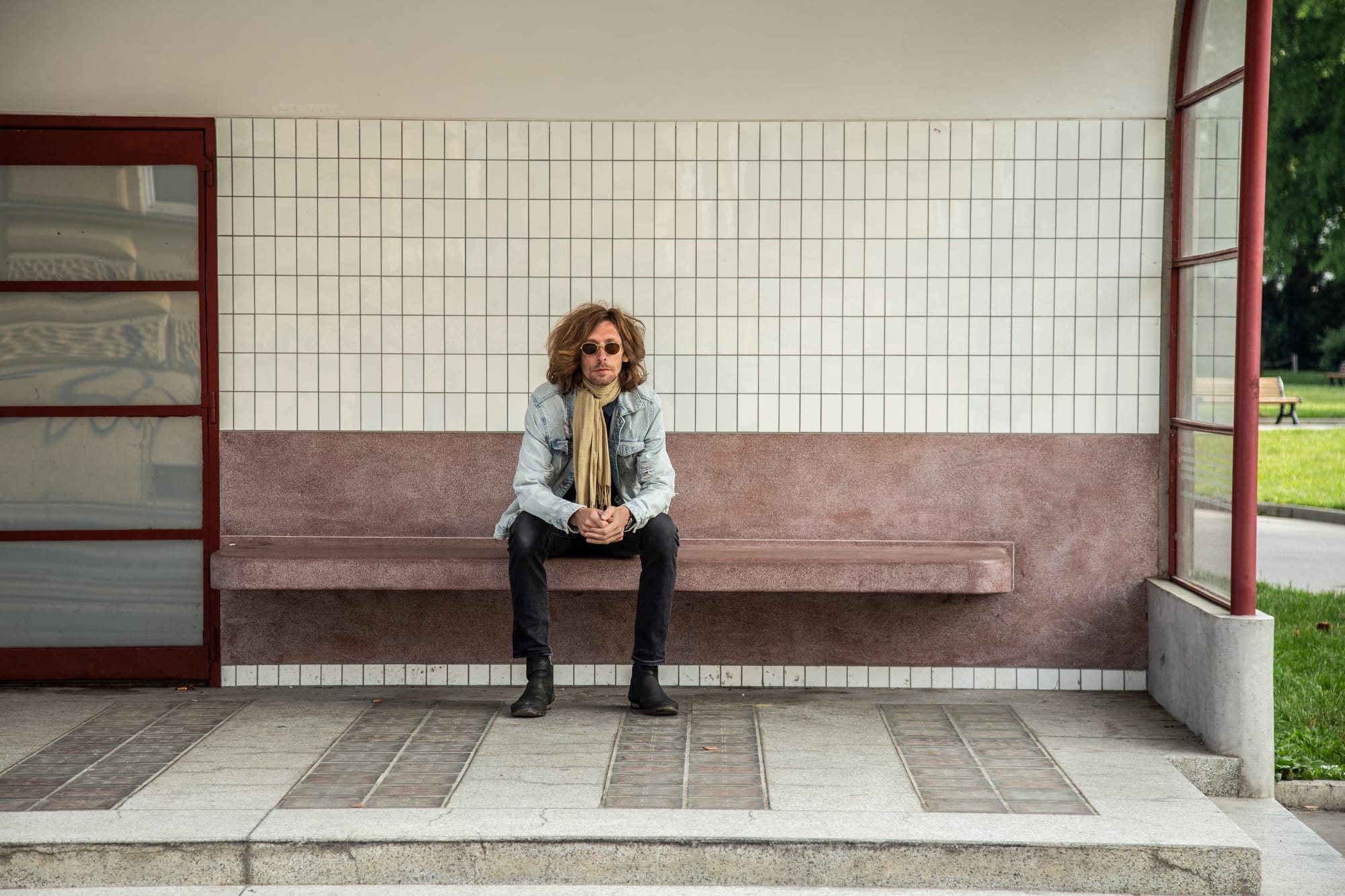This piece was written for the 2023/4 issue of Czech Music Quarterly – an established English-language magazine exploring the stirring universe of remarkable Czech classical and contemporary music. Czech Music Quarterly is published by the Czech Music Information Centre with the support of the Ministry of Culture of the Czech Republic, Prague City and the Czech Music Fund. To purchase a digital or print issue of the complete 2023/4 issue, please visit their website.
Mystical, all-encompassing, and fantastically strange – such were the words that occurred to me upon hearing Czech composer František Chaloupka’s music for the first time this spring in New York City. It was the 2023 world premiere of his ensemble work The Witch Waltzers on the SEM Ensemble concert at Bohemian National Hall celebrating cross-cultural collaboration between Czech and American composers. Czech composers Chaloupka and Petr Bakla flew out for the occasion and the concert also featured music by Petr Kotík, Christian Wolff, Pavel Zemek Novák, Pauline Oliveros, and Rudolf Komorous.
Founded in 1970 by Petr Kotík, the Brooklyn-based SEM Ensemble is a historically critical group and there is a wide artistic and personnel overlap between the Ensemble and Ostrava Days (OD). The Witch Waltzers was the first piece of Chaloupka’s to be performed by the SEM Ensemble, but his history with Kotík and Ostrava Days dates back to 2005 and 2007, when he attended the festival as an Institute resident. Chaloupka’s output is vast, and over the years, the Ostrava Center for New Music has programmed a broad array of his works including his large orchestra work Smooth the Heaven (OD 2009) and Eve & Lilith (a New Opera Days Ostrava 2012 commission).
The 2023 edition of Ostrava Days in particular showcased two substantial works by Chaloupka – the festival commissioned a new work for symphony orchestra titled Allegory of the Cave II for the Ostrava New Orchestra and programmed his flash-mob opera Bachelor Party (2022). Looking ahead to 2024, New Opera Days Ostrava (NODO) has commissioned Chaloupka to write a new opera, titled Zaprodanec (The Sell-out).
As a 2023 OD Festival resident, I had the opportunity to attend the world premiere of Allegory of the Cave II and the performance of Bachelor Party. In the following interview, we discuss Chaloupka’s newly premiered orchestral work, his upcoming opera, duality in music, narrative, the spiritual role of the audience, and Ostrava Days.
Anna Heflin: Your symphony orchestra work Allegory Of The Cave II (2023) premiered in Ostrava this year as part of Ostrava Days 2023, but looking into your catalogue, I’m noticing that you wrote another related work, Allegory of the Cave (2013), while living in Los Angeles during your studies at the California Institute of the Arts. How are these works related to one another? What inspired you to revisit this world after a decade?
František Chaloupka: Yes, I wrote the first part, called Allegory of the Cave, for a symphony orchestra in 2013 in Los Angeles, but I was never completely satisfied with it and I still plan to rewrite it. But reworking a piece is sometimes harder than writing a new one. Anyway, in the first part of 2013, I was exploring that Platonic myth outside of music, in the second part, from 2023, I contrasted this Platonic myth with the Vedic philosophy of the four ages, the four yugas, which repeat themselves cyclically. Each movement symbolises one yuga (more details about the composition can be found on my website). And because in my compositions I often work with the principle of duality (and also as a reference to the composition De Natura Sonoris by Krzysztof Penderecki), I decided to write the second part. I just enjoyed the topic so much, even after ten years, that I didn’t want to say goodbye to it. So the composition is based on completely new material that I composed from the middle of June to the middle of July this year. In the final movement, I also quote the version from 2013. I wanted there to be some connection with the first part, so they would form some kind of arc and continuity.
AH: What brings you back time and again to the idea of duality? I’ve been thinking about polarity and duality recently, and how polar material is often on the verge of becoming unified. Do you think of contrasting material as polar in this way, or as truly contrasting?
FC: I see something archetypal in duality. In the beginning it wasn’t even anything clearly defined in my compositions, more of a feeling. I see duality as one of the characteristics of our material world, our illusion – we have been constantly deceived by duality. At the same time, it is a state just before union, just before Unity. So it also has this dramatic charge. Duality is very elegant. At the same time, I enjoy the charge it creates, the tension. There is no drama about Unity (laughs).
AH: The ending of Allegory Of The Cave II (2023) is so mystical and you create timbres through your orchestration and use of percussion that sound electronic and otherworldly. Do you have a personal philosophy, or approach, to orchestration?
FC: My only approach to doing things is freedom, spontaneity, and a moment of surprise. And I try to be as authentic as possible. It may sound simple, but the opposite is true. I have no way of approaching orchestration, no preconceived charts and tables, so in fact, I always start from scratch. Otherwise, I probably wouldn’t even enjoy it. If we look at the history of music from, say, Gothic, Renaissance, Baroque, Romanticism to the music of the 20th century, we can get the impression that the history of music (that is, harmony in particular) develops in relation to what the human ear is able to detect in a harmonic series – simply put, the ability to hear develops to the ability to hear a higher and higher spectrum of harmonic series and to create and perceive more complex harmonies. The ability of human hearing, or at least the conscious use of hearing, is probably expanding. However, it is difficult to say how much of this ability is psycho-acoustic (hearing as such) and how much is aesthetic, i.e. conditioned and influenced by the times we live in. I believe that my ability to orchestrate is also related to the ability to perceive ultrasonic frequencies. And of course imagination plays a big role – the ability to imagine and hear different instrument combinations and registers.
AH: Referencing the tradition of allegory in your orchestral work implies a kind of hidden meaning or story. Looking through your works, I’m noticing numerous mythological and biblical references including your opera installation Eve & Lilith and perhaps also The Witch Waltzers. How do you approach the idea of reference, mythos, and narrative in your compositions? Does your approach change in a dramatic format with text, like an opera, versus writing for symphony?
FC: Even for instrumental music, I usually like to offer some context within which the artwork exists and can be perceived. It creates a certain atmosphere. Usually, I don’t like to just put individual sounds together. Some people disagree and say that music is music and any other textual accompaniment and non-musical content has nothing to do with music. I think it is up to the author what they define as a work and what falls within these limits. In fact, I also deal with different philosophies and practices in my personal life and this is naturally reflected in my compositions. But it is not a predetermined concept. It always turns out according to some natural feeling. In the case of an opera or some multimedia work – I cannot start composing the music until I know exactly what shape it will take, what stage action there will be, what each character will represent, and so on. So I usually first think about how the whole shape will look theatrically; according to what key the action on the stage will take place.
In compositions such as Piano trio No. 1 or Sonata for flute & loopers, there are no references. So I don’t avoid writing a piece called a symphony (even though that is already a reference to the symphonic genre of the past) or a purely instrumental chamber or orchestral piece. Of course, it’s different with opera, it usually offers some context; it is almost its essence. Although even in the opera genre, of course, a work can appear completely without a narrative. But I personally like the theatrical (visual, action-based…) element in opera, and I think that it makes opera unique.
AH: In a group lecture at Ostrava Days, you mentioned the concept of the audience as an “amplification of the concert”, as consciousness that enlivens a piece. Could you say a bit more about that idea? Do you feel that the performers have a similar enlivening effect upon a work?
FC: We know very little about consciousness. Some scientists say it can be studied only via introspection. In the West, philosophers such as Descartes, Schopenhauer, and Kant dealt with the concept of consciousness. Current quantum physics speaks of consciousness in the sense that the observer influences the course of the experiment. But I don’t think we can study consciousness in a lab, because it is at the core of Life itself. I will always remember that funny quip from the composer’s father, Louis Andriessen, about the German philosophers digging deep but finding nothing. Buddha spoke of consciousness circa 500 BC and I would consider his teachings comparable to the scientific methods of today. “Breath is the bridge between life and consciousness”, as the Vietnamese Zen monk Thich Nhat Hanh put it.
Our Western society is so confused we don’t even know what to eat properly for breakfast to stay healthy. How could we study consciousness? We must strive to be conscious. Contrary to what society thinks of being smart, in my opinion, being smart is to rid yourself of suffering and not inflict suffering on others. Of course we make mistakes. The Indian philosophy of Samkhya and Yoga uses the term Purusha, eternal spirit, eternal Consciousness, immaterial formlessness, without qualities, which is the primordial cause of all things. In Yoga, they also often emphasise that one should not identify with one’s thoughts or emotions, nor suppress them, but be a witness to them, observe them, be aware of them. “It doesn’t matter what you do, as long as you do it consciously”, they say. In that sense, I think it affects a lot of situations.

AH: Having attended the Janáček conservatory in Ostrava from 2000 to 2004, how has the Ostrava Days Festival impacted the city’s music scene? What changes have you noticed that international guests might not be attuned to?
FC: Petr Kotík and the 2001 Ostrava Days of New Music festival came up with the radical idea of giving space to avant-garde and pioneering works of the 20th and 21st centuries. To honour the tradition, that is, the works of the 20th century, and at the same time offer context and comparison with contemporary pieces. Usually, the music of the 20th century, eighty to a hundred years old, is presented as the most radical and contemporary. There had never been anyone here before who dared to take such a risk on such a scale. They gave the opportunity not only to composers, but also to performers and listeners to develop. This symbiosis between composers, performers, and listeners is very important because it creates a community with mutual support and growth. So it has an effect on the self-confidence of the entire organism and musical culture. The festival has not only influenced the music scene of Ostrava and the Czech Republic, but the whole of Europe, and its cultural value is incalculable. I don’t think foreign guests have to get used to anything. Mostly I was met with enthusiastic reactions. Imagine that I had just started studying composition at the Janáček Conservatory in Ostrava and all of a sudden big names from 20th century music textbooks appeared there. Not only on the festival programme – these guys actually came in person.
AH: Yes, everyone who I have met has been thrilled to be there! Having attended for numerous iterations, has there been a performance of a work (not one of your compositions) that has been particularly influential? Or are there any particularly memorable conversations that stand out in your mind’s eye?
FC: I don’t trust composers who talk too much. Usually, I only trust those who say what is necessary. For example, I have some problems with similar conversations that we are having right now. On the one hand, I’m glad that I got to brush up on my thoughts on various topics, but on the other hand, I’ve never fully trusted words. Where there are words, there are problems. Words are used to solve problems, but they often cause the most problems. I understand the use of words and speech to play. Games or problems, take your pick (laughs). People just can’t keep quiet. Because of the drama constantly running in our heads, we can’t see reality as it is. A man is what he is when he is silent. I also sometimes sense that a lot of those composer debates are intellectualism, simply showing off. But I had very nice conversations with composer Bernhard Lang, who gave me his practical experience with opera, with composer Richard Ayres, conductor Bruno Ferrandis, as well as other musicians, about specific things.

AH: New Opera Days of Ostrava (NODO) commissioned you to write Eve & Lilith (2012) for their inaugural opera festival, and you will be premiering a new opera at NODO 2024. Can you share something about this new composition? How has your approach to opera been informed by your experience at NODO in 2012?
FC: The opera for the next year of the NODO festival is called Zaprodanec (The Sell-out) and is based on my own libretto. As a kind of “medium”, subject, we chose the historical figure, teacher of nations and icon of Czech culture Jan Ámos Komenský (John Comenius), whose theological and didactic writings were sponsored by the Swedish arms industry. However, the realities of the opera are completely contemporary. The cast includes an orchestra of almost forty musicians, plus a choir and soloists. This is the project I am currently working on the most. Even here in Spain during my three-week artist residency. I learned from the opera-installation Eva & Lilith from 2012 mainly in terms of organization – it was only performed as a kind of torso. Opera, whether chamber or orchestral, will always represent a complex production in which many parties participate, and opera houses, festivals, or the authors themselves usually have no tools that would provide a clearly defined framework – everything is created on the fly and each project is unique and different. The infrastructure is perhaps slowly being born, and we can only hope that funds for new works will only increase.

AH: Have you written a libretto before? Regardless, what has that process been like for you? Do you write the libretto and the music simultaneously?
FC: I wrote the libretto for my chamber opera-installations Eve & Lilith, Chata v Jezerní kotlině (Cottage in the Lake Basin, 2016) and the flashmob opera Rozlučka se svobodou (Bachelor Party, 2022). I used to write songs and lyrics, and just as I couldn’t imagine singing someone else’s songs, I can’t imagine composing music to someone else’s words. Content-wise, I find it hard to find someone you resonate with, and technically, I don’t even find it appropriate. The text already contains a lot of information such as colour, texture, meaning, atmosphere, meter, and rhythm, and therefore forces you into a certain musical position. I find it more organic when the music and the text are created at the same time. When it comes to the opera stuff, first of all I think about the scene and the stage situations, I just cannot start composing in a vacuum. I have to know the motivations of the characters first, I enjoy inventing stage situations that would then somehow correspond with my music. So I think first and foremost as a writer, stage designer, or director. This is also the case with the opera I am currently preparing for the NODO 2024 festival. It seems to me that this way I can afford much more, that the singers’ actions can be much more musically accompanied.

